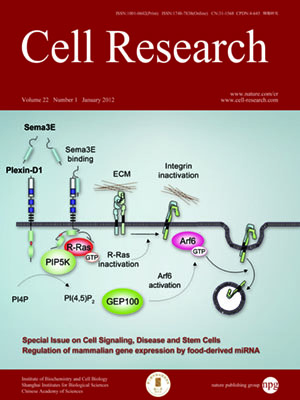
Advanced Search
Submit Manuscript
Advanced Search
Submit Manuscript
Volume 22, No 1, Jan 2012
ISSN: 1001-0602
EISSN: 1748-7838 2018
impact factor 17.848*
(Clarivate Analytics, 2019)
Volume 22 Issue 1, January 2012: 194-207
Chengyan Wang1,*, Xuming Tang1,*, Xiaomeng Sun1,2,*, Zhenchuan Miao1, Yaxin Lv1, Yanlei Yang1, Huidan Zhang1, Pengbo Zhang1, Yang Liu1,2, Liying Du
2Laboratory of Chemical Genomics, Shenzhen Graduate School of Peking University, The University Town, Shenzhen 518055, China
Correspondence: Hongkui Deng,(hongkui_deng@pku.edu.cn)
Embryonic hematopoiesis is a complex process. Elucidating the mechanism regulating hematopoietic differentiation from pluripotent stem cells would allow us to establish a strategy to efficiently generate hematopoietic cells. However, the mechanism governing the generation of hematopoietic progenitors from human embryonic stem cells (hESCs) remains unknown. Here, on the basis of the emergence of CD43+ hematopoietic cells from hemogenic endothelial (HE) cells, we demonstrated that VEGF was essential and sufficient, and that bFGF was synergistic with VEGF to specify the HE cells and the subsequent transition into CD43+ hematopoietic cells. Significantly, we identified TGFβ as a novel signal to regulate hematopoietic development, as the TGFβ inhibitor SB 431542 significantly promoted the transition from HE cells into CD43+ hematopoietic progenitor cells (HPCs) during hESC differentiation. By defining these critical signaling factors during hematopoietic differentiation, we can efficiently generate HPCs from hESCs. Our strategy could offer an in vitro model to study early human hematopoietic development.